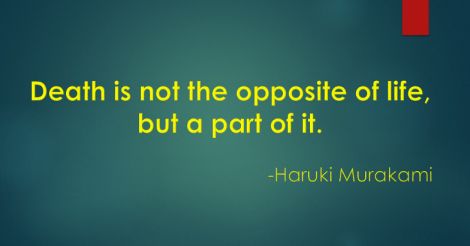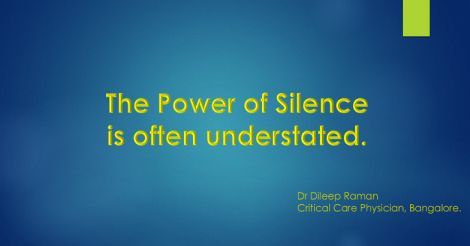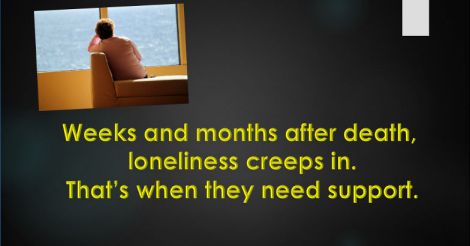Few people are comfortable visiting a home where death has just occurred. For some, it can be a sense of awkwardness—a fear of saying or doing something inappropriate, or an aversion to seeing grief-stricken people.

Whether we are comfortable with it or not, visiting bereaved families is part of living in society. Unfortunately, we sometimes see inappropriate things being said during such an occasion. The person who made the comment might not have meant badly, but wrongful words and actions can cause a lot of hurt in these delicate situations.
Good and bad manners do exist about visiting the bereaved, albeit with some variation between cultures. In any context, bad manners are those that make other people uncomfortable. For example, chewing loudly with an open mouth and talking with one’s mouth full of food are considered bad table manners not because the offender has a problem with it, but because the others would find it repulsive.
Likewise, the person who passes an ugly remark at a solemn family function might not even realise what he said or did was hurtful. Unfortunately, while social topics like table manners get discussed at home or at school, most of us have not received any formal training on this sombre topic.
That being said, our approach to the bereaved cannot be generalised beyond a point; each situation is unique, as is each family. For instance, the death of a teenager is perceived differently from that of a 90-year-old. Unexpected death, especially of the violent type can result in an emotionally supercharged situation, requiring us to tread very carefully to avoid offending anyone.
This article is written to highlight the do’s and the don’t-s in most situations. It is specifically meant for those who are contemplating visiting a recently bereaved family.
Common blunders while visiting the bereaved:
1. Loud conversation on unrelated topics.
While visiting, people tend to get drawn into conversations unrelated to the bereavement, at times even catching up on gossip. This can occur when friends or colleagues show up and we forget for a moment that it is a solemn occasion.
“Where are we meeting for lunch today?”, “How was the movie last night?”, “What’s the score?” are typical blunders that happen, which impart an uncaring celebratory tone to the visit.
2. Interrogation.
As hard as it can be to believe, some overly curious visitors have the tendency to interrogate the family about the cause of death.
“Can you tell me what exactly happened? He seemed fine when I saw him last week!” “Did you check her cholesterol?” “What did the first ECG show?” “Was he wearing a helmet?” “When was her last chemo?” are but a few examples of such unwarranted questions.
For the family, the trauma of having to retell the story over and over can be horrific. Visitors must realize that none of these questions would bring the person back; there is no second chance in death.
3. Comparison.
A common blunder by well-meaning visitors is to try and compare with their own limited experiences. No two families and no two deaths are the same; it is therefore a pointless exercise.
“I remember my neighbour had a much more terrible time with the same disease. You are lucky he went early!”
“I know how you feel, I was devastated when my cat died last year!”
4. Amplifying.
 Silence is golden: Mark Twain’s classic quote is noteworthy in the context of visiting a bereaved family. People sometimes blurt out statements in the hope of comforting the grieving, but achieve exactly the opposite.
Silence is golden: Mark Twain’s classic quote is noteworthy in the context of visiting a bereaved family. People sometimes blurt out statements in the hope of comforting the grieving, but achieve exactly the opposite.Some people have the knack for amplifying or worsening the existing sorrow by dropping pessimistic remarks such as “Oh…she was so young, she had her whole life ahead of her!”, “How sad it is for her children!” When in doubt, silence is the best option.
Silence is golden: Mark Twain’s classic quote is noteworthy in the context of visiting a bereaved family. People sometimes blurt out statements in the hope of comforting the grieving, but achieve exactly the opposite.
5. Loud ringtones.
Unless we actively keep our phones in silent mode, a loud and abrupt musical ringtone tearing through the silence can be quite unsettling during the visit. This is made worse when people pick the phone up and start talking at the top of their voice as though they were at a party.
6. Wrong focus of attention.
While visiting the bereaved, our focus should remain completely on the departed, and the grieving family. Any distractions must be shrugged away until we are out of sight, and away from earshot.
7. Wrong number.
As absurd as it might seem, in today’s fast-paced world, there are instances of people placing wreaths on the wrong coffin, and even consoling strangers after mistaking them for immediate family. If we are not familiar with the deceased’s family, it is better to introduce ourselves and verify the identity of key family members before proceeding to offer condolences.
8. Playing judge.
There is a tendency to judge whether the person deserved to die the way he or she did. Discussions about unhealthy habits leading to an early demise can be reserved for later. When attending a senior person’s funeral, enquiring publicly about the age of the deceased is inappropriate, whereas nodding in approval of the stated age is downright rude. Others go the extra mile and debate whether the person might actually make it to heaven or settle for hell.
9. Blaming the family for not doing enough.
Another common mistake is to pass remarks on how the family could have taken better care of the person who passed. The truth is, each family is unique, and a visitor will have little idea about the actual pains that the family went through to keep the person healthy and alive.
Passing such a negative remark is easy, just like watching cricket on TV and blaming a fielder for dropping a crucial catch – the person criticising has no idea how hard it is to be out there performing.
10. Blaming the parents.
Upon hearing the news of a young woman who died in a car crash, a purported well-wisher arrived at the parents’ home and declared: “What sort of parents would allow a young woman to drive a car alone to work at night?” Such words only deepen the pain and guilt that the parents are already suffering.
Although attitudes and risk tolerances vary, no sane parent would knowingly do anything that would harm their child. The loss of a child is particularly devastating for parents, and it is totally wrong to pass such remarks that implicate their role in the child’s death.
11. Blaming the hospital.
Unfortunately, blaming the healthcare establishment is a convenient way to vent the inevitable anger and grief. In such situations too, it is helpful to remember that no hospital would knowingly do anything that could harm the patient.
Medicine is not an exact science, and the human body is not a machine that has replaceable parts or even an instruction manual. Medical decision making is among the most complex tasks known to man; and not all decisions lead to a positive outcome, although taken in good faith. Some illnesses are so severe that the body would succumb despite doctors doing their best. Blaming the family for not choosing another hospital or doctor is a common and futile exercise that occurs at bereaved homes.
12. Proclaim miracle cures.
After a person succumbs to illnesses such as cancer, some visitors make public assertions about magical cures that have no scientific validity, claiming that the person could have been alive through such means. Such dramatic statements serve no useful purpose to anybody except perhaps the perpetrator.
13. Criticise the departed.
It is not uncommon to hear one person pass a negative remark about the deceased person’s character, soon to be joined by other likeminded people who fuel the conversation into a full-fledged debate. “He was a good banker but wouldn’t part with a dime if you ever asked him”
14. Criticise the family’s demeanour.
Then there are a few whose sole purpose of visit seems to be to estimate how grief-stricken the family is. Such people can be heard passing comments like “When you look at her, she doesn’t come across as someone who just lost her husband. She was neatly dressed and even had her hair put up. Oh, I forgot… I think she was also wearing lip gloss!”
15. Inject gender bias.
Unfortunately, when a son dies, some people come up with public statements along the lines of “They’ve lost their only son” which is an unfair statement that reeks of gender bias. For a parent, sons and daughters are equally precious.
16. Use silly cliché words of comfort.
We often hear people say things like “Don’t be sad”, “Don’t cry”, “It is all for good”, “I know how you feel”, “He is in a better place now” in an attempt to provide comfort. Such words are of little use to someone who has just lost a loved one. After bereavement, a person goes through denial, anger, bargaining, depression and finally acceptance—these stages take time. Asking the person not to cry is like choking a person who is already gasping for air.
Incidentally, it is perfectly acceptable not to cry, as each person processes grief differently.
One must specifically avoid words that trivialise the event, some hilarious examples being:
“I can’t believe he is dead…he looks like he might just get up any minute! Are you sure he is dead?”
“You are lucky you have one other child who is alive!”
“I used to tell her to eat less and exercise more often. Her startling determination to do exactly the opposite, was amazing."
17. Impose our beliefs on someone else.
There are all kinds of people in the world with vastly contrasting belief systems—each convinced that theirs is the right version. It is a common slip-up for people to assume that sharing their own religious beliefs would bring solace to the bereaved family. Although their intent might be good, it doesn’t always work that way.
In fact, unless we are absolutely certain of the family’s religious and spiritual convictions, it is better to avoid the topic altogether, and give them some space instead.
Just as “It is all part of God’s plan” might not go down well with an atheist, “He will soon be reborn into a more beautiful life” can be hugely offending to someone who doesn’t believe in rebirth.
“According to my calculations based on astrology, he could not have chosen a better time to die” is another example of saying the wrong thing in the wrong place at the wrong time.
18. Message bloopers.
It is important to avoid language bloopers like “hearty condolences”, a common error in this part of the world. The word ‘hearty’ means happy and should not be confused with ‘heart-felt’. ‘Everything will be fine’ is another passé phrase where both the speaker and listener know it’s a lie.
19. Taking selfies.
One of the worst bloopers and a bane of modern technology when not done right, taking unsolicited photographs is a total no-no at a home where death has just occurred.
20. Advertising oneself.
In an attempt to get noticed by everyone, some folks have a tendency to be loud and overdo their visit. It is helpful to remember that this is not a place where attendance gets marked, and definitely the last place to be soliciting one’s business regardless of what it might be.
Good behaviours while visiting the bereaved
1. Actions speak louder than words.
A compassionate gesture is often all that’s needed while visiting the acutely bereaved. For some cultures, a soft hug is appropriate, while for others a gentle squeeze of the hand will do. The gesture must be in line with the person’s proximity to the family, and the family’s own cultural preferences.
2. Listen.

Often, the best thing one can do is to listen patiently without interrupting. The bereaved person could be venting out emotions and if we simply give them our ears, it will be comforting. It is worth knowing that they are not always expecting a reply from us—we just need to listen. It is also important to listen keenly—that is, without looking at our watches in between, fidgeting with our fingers or letting our eyes wander.
3. Limit words to a minimum.
At the point of acute loss, the person will be numb and will not be able to listen to long lectures and suggestions by visitors. While silence is perfectly acceptable, a few well-chosen, soft words of comfort can help ease the pain.
Examples are “I am sorry for your loss”, “We are here to help in any way that we can”, “I will check back on you tomorrow, I am just a phone call away”
Those who are emotionally close to the bereaved person may quietly ask “How are you” and give them a chance to express their feelings.
4. Avoid unsolicited advice.
Though a useful principle to follow universally, it is most handy while visiting the bereaved. The last thing the family wants at such a difficult time is advice. During subsequent visits, suggestions can be offered, but only when sought by the family.
5. Volunteer where feasible.
There will be things to be done at the home, such as taking care of guests or handling phone calls. Those who are close to the family may volunteer to do such tasks.
6. Dress appropriately, lose the perfume (and sunglasses).
Doing away with anything that suggests we are arriving at a party is sensible. Deciding to stop by at a funeral on the way to a wedding, therefore, can be suicidal. Wearing black or pale shades are just fine unless there are specific protocols in place. Leaving footwear outside is part of local culture in India, and is a respectful gesture in this context.
7. Respect culture. When in doubt, ask.
Families differ in their religious beliefs, social preferences and cultural outlook. If not familiar with the situation, it is helpful to call a friend who knows the family, to find out beforehand when and where to visit, and what the right thing to do is while visiting.
8. Give meaningful help.
Financial and logistics assistance—where acceptable and appropriate—can be a big relief. Rather than ask “Do you need anything” it is better to be specific about what we can do for them. Such tasks can include arranging for the ambulance, delivering food, cleaning the house, doing the shopping, taking care of paperwork, keeping smaller children occupied and assisting with funeral arrangements.
Those who are close to the grieving family can gently make sure that they don’t miss their meals. If a family member has persistent trouble sleeping, help must be summoned. Sleep is a basic bodily need, and lack of it can take a person down in no time.
9. Donate time.

Sometimes termed the Art of Presence, one of the best gifts one can give is the gift of time. During the weeks and months of loneliness that follow, especially after the crowds disperse, the bereaved person might feel that the world is avoiding them. Making a phone call or a visit can mean a lot during such times.
10. Discuss the good times.
Although not a good idea immediately after the passing, subsequent visits with the family can be enlivened by conversation about the good memories we had together with the person.
The family would have got over the immediate grief and anger by then, and will be receptive to conversation. Recalling a good deed that the person did, but the family was perhaps unaware of, can be particularly heart-warming.
“I remember how she encouraged me to get good grades and once even offered me a ride home after school. We loved her as our class teacher, she meant so much for all of us.”
In summary, visiting a grieving family requires good knowledge of etiquette as outlined above. The do’s as well as the don’t’s are important. As there is no room for error, it is better to go prepared than be caught by surprise not knowing how to respond in such situations. Silence is a good option; a kind gesture can speak better than words. The urge to dish out free advice and meaningless platitudes must be resisted. Though the above list is handy, we need to be extraordinarily perceptive and must have the ability to adapt according to the mood and vibe prevailing in each instance.


























